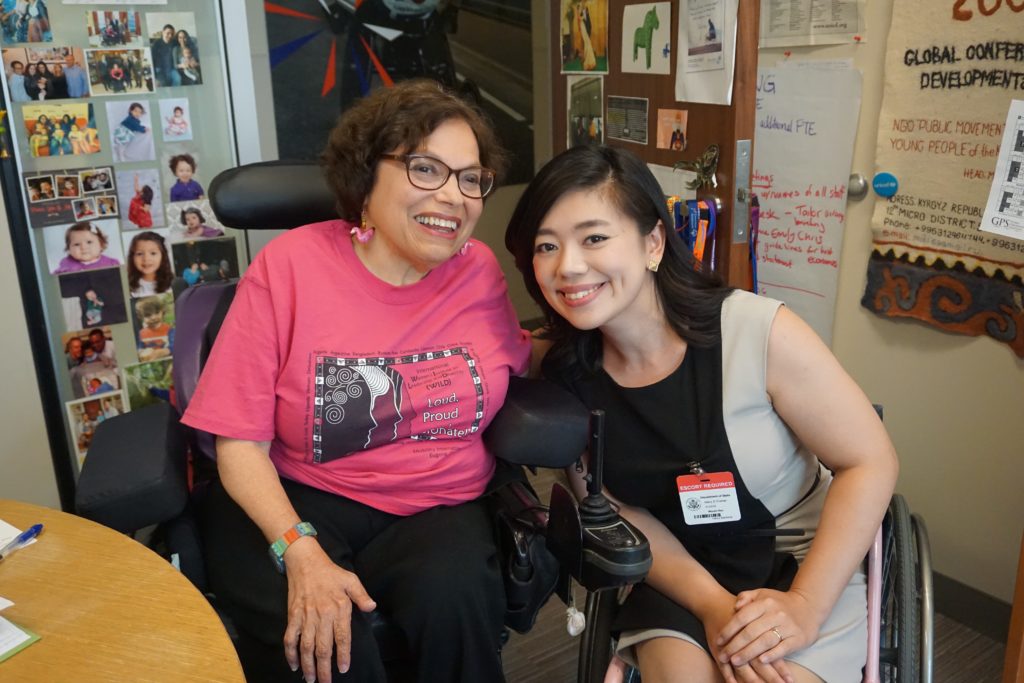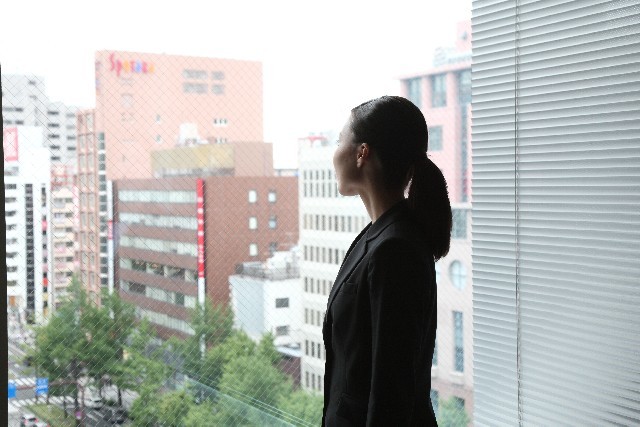This article is also available in: 日本語
1 and half year ago, I was selected as a fellow of Duskin Ainowa Foundation, and I joined their lecture to learn about the history of disability movement in the US. I spent 2 years in the US for college, so I knew the accessible environment for wheelchair users as well as that disabled people live actively in a community. However, I am ashamed to say that I didn’t know the historical background of disability movement. This time in Washington DC, I had a precious opportunity to meet Judith Heumann, who is one of the key persons of disability movement in the US. She is a special advisor for international disability rights at U.S. Department of State.

Judith Heumann is from New York. She had polio when she was 18 months, and became a wheelchair user. Today, students with disabilities can receive general education in public school in the US. However it was totally different story when Judith, 68 years old now, was a child. Schools refused her to enter because of her disability, and even a university rejected her dormitory application. Judith’s parents became strong advocates for her and worked with thousands of parents to fight for her rights of education. With their efforts, she could receive education that she needed.
What made her famous in the US was when she took a test to get a teaching license. She passed a paper test and interview, but she was rejected in a physical check. She couldn’t believe the result and sued Education Department of New York City. Eventually she won the lawsuit and got a license. She became the first teacher in wheelchair in New York City.

In 1972, Judith traveled to Germany. It was the first time for her to go to a foreign country. In there, she saw the same kinds of discriminations toward people with disabilities that the US had. She found that every country has similar issues in employment, education, housing although each country has different economic circumstance. From the finding, she decided to work internationally. Judith has worked for World Bank and US government about 23 years. She chose this field because she likes to challenge, wants to work with smart people, and to take ownership of the issues.
Her current work at US Department of State is to help people in the State Department, including embassy around the world, have clear understanding of types of human rights violation that disabled people experience in their country and help employees at the State Department able to engage and integrate disability into foreign policy and diplomatic work.
Judith said,
American people who work in a foreign country do not necessarily follow the happenings in the US. My job is very important to educate people on the importance of a strong civil society. In some countries where the government limits NGOs. Disability community needs to be strong, so I and many other people have fought for regulations and laws.

I asked Judith some questions related to employment of people with disabilities which is my research focus. One of them was,
“What would be top 3 important keys to create an inclusive working environment?”
Judith answered,
At first, close all segregated workplace such as a sheltered workshop. Although we have high unemployment rate of people with disabilities in the US, most of employed people with disabilities are working in an integrated environment. Education is very important. By receiving education, the job capacity that they can do in the future will be wider too.
Next, train leaders in business community. They need to have deep understanding and respect for the difference of each person and strength of diversity. Employees with disabilities need to be integrated in workplace. By working together, employers will have new findings that leads to more accessible products and service.
At last, it is important that laws are implemented. Even if there are many laws to protect people with disabilities, it doesn’t have any power if they are not implemented.
Sheltered workshop for people with disabilities still exist in the US, but some states are closing down completely. This movement is based on US government belief that people with disabilities can be in competitive employment (=earn more than minimum wage) with reasonable accommodation. Right now, many people who work at a sheltered workshop earn less than minimum wage. Moreover once they work in a sheltered workshop, majority of people stay in there and do not move to a competitive employment. With this situation, people with disabilities cannot develop job skills, cannot be independent financially, and that gives a huge impact to the country. Therefore, US government has implemented a custom employment, supported employment which promotes people with disabilities to work in competitive employment by utilizing their abilities at integrated workplaces. (I will write more about custom employment, supported employment in an interview article of US Department Labor.)

Japan also has segregated workplaces for people with disabilities. We have sheltered workshops and sheltered offices under the large corporations. Compared to integrated workplace, those sheltered workshop and office have clear gaps in salary and job quality and quantity. I wonder if some employers think that it is an easier way to manage employees with disabilities, and if people with disabilities actually feel safer in the sheltered environment? I would not say that working in a sheltered workplace is a bad thing. Sheltered workshops gave many people with disabilities employment opportunities.
However, I found that people with disabilities working in a sheltered environment often have hard time at building enough skills and experiences to pursue a other career opportunities. If a sheltered workplace can be a place for people with disability to develop basic skills and working experience it would be very valuable. If the place can help increasing the number of people transferring to an integrated workplace to develop career, it is beneficial for people with disabilities, employers, and society. To realize it, both employers and employees with disabilities have to have new points of view toward employment and career of people with disabilities. Japan needs a shift from an old system that protects people with disabilities to a new system that develops and utilizes abilities of people with disabilities. I really want to make it happen.

Judith Heumann also speaks up as a women with disabilities. In this world, just being a woman can be treated unequally. If a disability is added, more issues come up.
Judith said,
Many people are born without disabilities. However if people have a disability, they have more possibility to have violence or abuse physically and mentally. Sexual abuse toward women with disables is a serious problem. All women have to supported each other. I, as a woman with disabilities, think it is important to be myself and a powerful speaker and leader.
Personally I had not thought about myself as a woman with disability deeply before I started my research, although I had thought myself just as a woman or person with disability. While I visit various companies and disability advocates, and attend conferences. I heard the word, “woman with disabilities”. That made me start thinking I should take actions as a women with disabilities. It is true that woman with disabilities are placed in weak position now, and because of the truth, we have to speak up and deliver our thoughts and opinions to society. It is a very important thing that other people may not or cannot speak for us.

At last, I asked Judith about her ideal society.
A peaceful society that all people respect the difference of sex, age, religion, disability, and feel value of equality. For example, in accessibility, it is not only about architectural accessibility, but also accessibility to information or accessibility to working environment that people can receive reasonable accommodation and maximize their work performance.
Meeting Judith Heuman is one of the biggest goals that I wanted to archive during my research period. She has close relationships with other fellows from Duskin Ainowa Foundation over 35 years, and has visited Japan too. By learning more about her work, I found that she works aggressively in the US and other countries for rights of people with disabilities. Judith Heumann is loved by so many people because she has experienced discrimination and prejudice, and fought against them since she was little. Because of the background, her message can be very persuasive and strong that reach to people’s hearts. I found that to change the society better for people with disabilities, it’s essential for people with disabilities themselves to take actions. Thank you, Judith Heumann.
At very last, last month, an article “10 Badass Disabled Women You Should Know About” was released and shared by many people on SNS. Judith Heumann is one of them. Please check it!
10 Badass Disabled Women You Should Know About
http://www.autostraddle.com/10-badass-disabled-women-you-should-know-about-346192/
